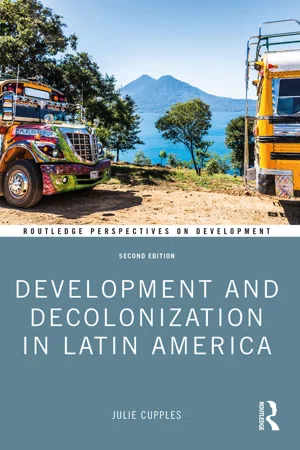
- 324 pages
- English
- ePUB (mobile friendly)
- Available on iOS & Android
Development and Decolonization in Latin America
About this book
Written in an accessible language, this book is a fully updated and revised edition of Latin American Development, a text that provides a comprehensive introduction to Latin American development in the twenty-first century and is anchored in decolonial theory and other critical approaches.
This new edition has been revised and updated in a way that takes into account recent changes in political leadership, the retreat of the Pink Tide, the Colombian peace accords, new forms of political and territorial mobilization, the intensification of extractivism, murders of environmental defenders, major disasters, and the new contours of feminist and anti-patriarchal struggles. It features new chapters on decolonial theory, Latin America in the world, disastrous development, Afrodescendant struggles, and the Latin American city. The book emphasizes political, economic, social, cultural, and environmental dimensions of development and considers key challenges facing the region and the diverse ways in which its people are responding, as well as providing analysis of the ways in which such challenges and responses can be theorized. It explores the region's historical trajectories, the implementation and rejection of the neoliberal model, and the role played by diverse social movements.
It is an indispensable resource for students and university lecturers and professors in development studies, Latin American studies, geography, anthropology, sociology, political science, economics, and cultural studies. In addition, it provides an invaluable introduction to the region for journalists and development practitioners.
Tools to learn more effectively

Saving Books

Keyword Search

Annotating Text

Listen to it instead
Information
Chapter 1Made in conquestThe making of contemporary Latin America
The failure of development
Table of contents
- Cover
- Half-Title Page
- Series Page
- Title Page
- Copyright Page
- Dedication
- Contents
- List of figures
- List of tables
- List of boxes
- Acknowledgements
- List of abbreviations
- Glossary
- Chapter 1 Made in conquest: The making of contemporary Latin America
- Chapter 2 A decolonial history of Latin America
- Chapter 3 Coloniality, capitalism, and neoliberalism
- Chapter 4 Extractivism and ontological politics
- Chapter 5 Latin America in the world
- Chapter 6 The coloniality of gender and sexuality
- Chapter 7 Indigenous politics and movements
- Chapter 8 Afrodescendant politics and movements
- Chapter 9 Disastrous development
- Chapter 10 The Latin American city
- Chapter 11 Making the decolonial turn
- A playlist for rebellion and decolonization
- References
- Index
Frequently asked questions
- Essential is ideal for learners and professionals who enjoy exploring a wide range of subjects. Access the Essential Library with 800,000+ trusted titles and best-sellers across business, personal growth, and the humanities. Includes unlimited reading time and Standard Read Aloud voice.
- Complete: Perfect for advanced learners and researchers needing full, unrestricted access. Unlock 1.4M+ books across hundreds of subjects, including academic and specialized titles. The Complete Plan also includes advanced features like Premium Read Aloud and Research Assistant.
Please note we cannot support devices running on iOS 13 and Android 7 or earlier. Learn more about using the app